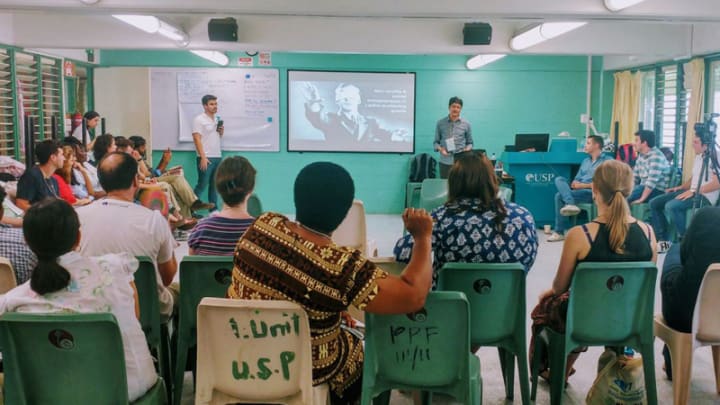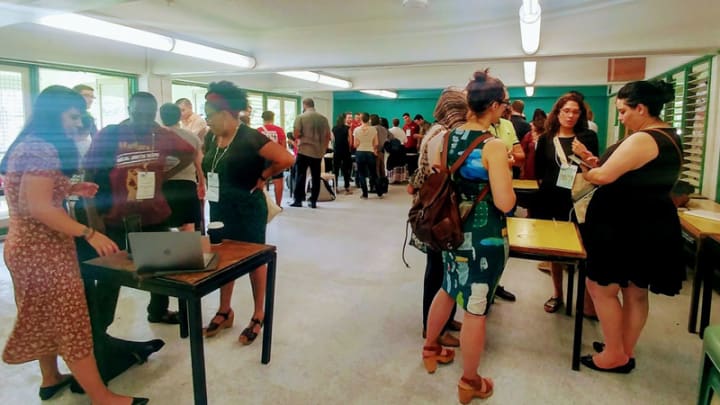
Citizens’ voices and demands for state transparency and accountability are important ingredients for a healthy democracy. When people raise their voices around issues they care about — including health services and education — they insist on greater responsiveness from the government that is meant to serve them.
Counterpart International’s role is to ensure that the social sector — citizens coming together to advance the social good — is strong, dynamic, inclusive, and visionary.
We coach over 2,600 social sector organizations and more than 70 social sector networks around the world to help people advocate for themselves and their communities. We help them clarify their purpose, build and execute a strategy that can achieve an audacious social or economic goal, garner voices and coalitions, and measure milestones that capture tangible progress and deliver much-needed momentum.
We co-create and curate innovation networks in our role as a “helper hub” partnering with CIVICUS and Tides Center. And in our internet governance and internet freedom program, we support digital security so that online activists don’t face physical harm.
This dialogue ensures that critical development investments advance people’s well-being. But there is no clear causal relationship between increased voice and greater accountability. It is important to understand the context in which citizens raise their voices and the conditions under which government responds. This dynamic determines the effectiveness of citizen activists.
One thing is certain: Civic space is closing around the world. Attacks on civil society, activists, and even on ordinary citizens who want to have their say in service delivery, chill civil society engagement. Restrictions on foreign funding for civil society thwart efforts that international donors and foundations have made to bolster activists. China, India, and Russia alongside Cambodia, Hungary, and Uganda have blocked foreign support for domestic civil society in recent years.
Against this backdrop, how can citizens exercise their fundamental rights of freedom of expression, carry out their civic duty to hold governments to account, and channel critical information about service delivery so investments in health and education are well-placed?
Here are five ways development practitioners and Counterpart International’s partners can amplify the citizen voice to drive community-led change.
1. Prioritize activists’ physical security.
In June 2018, we hosted a panel discussion on the growing threats that activists in Africa, Latin America, Eastern Europe, and Southeast Asia face in the digital space. Panelists discussed the troubling global trend of governments seeking to control, shape, and silence the digital space through propaganda and misinformation.
Despite coming from different countries and regions, the six activists on the panel identified parallels between their experiences. In many of their home countries, they are witnessing a shrinking civic space in which the persecution of journalists, human rights defenders, and civil society activists is becoming increasingly common through tactics such as violent crackdowns and online harassment.
Panelists noted that educating communities on digital security risks and using tools such as Build a Movement’s Whistler app can protect their identity online, and that is a good first step to ensuring physical security offline.
2. Ensure affordable internet access.
Some governments create financial barriers to prevent people from accessing the internet — including taxes on social media to raise the costs for people communicating and organizing online. The Alliance for Affordable Internet advocates that making broadband internet access cost 2 percent or less of gross national income per capita will make internet access more available for the bottom 20 percent of income earners. Lowering the barriers to internet access can also do a lot of good toward lowering the global gender divide.
3. Build capacity through peer-to-peer networking groups.
The internet is essential to a healthy, functioning democracy in which everyone has a voice and a space to express oneself publicly, associate and organize with others, and seek and impart information across boundaries. The internet can provide the level playing field for the broader civil society community — e.g. the media, academia, human rights activists, policy specialists, etc. — to fully participate in public policy discussions. We believe it is vitally important to support grassroots actors and organizations struggling at the state level to advocate for a free, open, and safe internet for all.
“Let’s work together to defend and strengthen civic space and help people everywhere overcome restrictions to basic freedoms of assembly, association, and speech.”
— Ann Hudock, executive vice president, Counterpart InternationalAn example of capacity building through peer-to-peer sharing is Innovation for Change, a global network of people and organizations who want to connect, partner, and learn together to overcome barriers to closing civic space and restrictions to the basic freedoms of assembly, association. and speech. I4C is a community-led network of seven connected regional hubs across Africa, Central Asia, East Asia, Latin America and the Caribbean, the Middle East and North Africa, and South Asia. Here, people exchange ideas and share their successes and failures to spark collective action and incubate social change.
4. Use encrypted forms of communication.
Encryption enables people to send messages to others without fear that the messages will be read by others — like a telecom company relaying the message, or even the state. Inside authoritarian states, encrypted channels of communication provide a space for citizens to communicate and organize without government surveillance. This is why Iran and Russia have tried to block Telegram, and why it is important that other end-to-end encrypted apps, such as WhatsApp and Signal, continue to provide protected channels for communication despite the possibility of abuse by criminal and terrorist organizations.

5. Partner with innovative and pro-social good technology organizations.
In a perfect world, we’d use digital tools such as Twitter and Facebook to inform people and elevate dialogue. But individuals, organizations, and government have taken advantage of social and digital platforms to drown out dissenting voices by disseminating propaganda and disinformation.
A recent study on the use of disinformation and propaganda in Latin America identified three strategies used by the Venezuelan government on Twitter to distort messages and interfere in the conversations of opposition communities. These strategies contributed to the violation of the right to free expression and association, access to information, and participation in public affairs debates, which are fundamental to a free, open, and human rights-oriented internet.
Algorithms and crowdsourcing are powerful vehicles in the digital era, and help shape how people find and share information online. They can also help with hoax detection, identifying fake news and propaganda to educate readers without censoring it.
Let’s work together to defend and strengthen civic space and help people everywhere overcome restrictions to basic freedoms of assembly, association, and speech.
How can we bridge the gap between commitment and action to advance women’s leadership in development? #GlobalDevWomen Leadership Week, taking place Nov. 12-16, will explore tips for professionals and organizations on how to bridge the gap and reach gender parity. Through advice articles, op-eds from industry leaders, online events, and a virtual career fair for mid-senior level women professionals, this week is devoted to closing the gender leadership gap.



